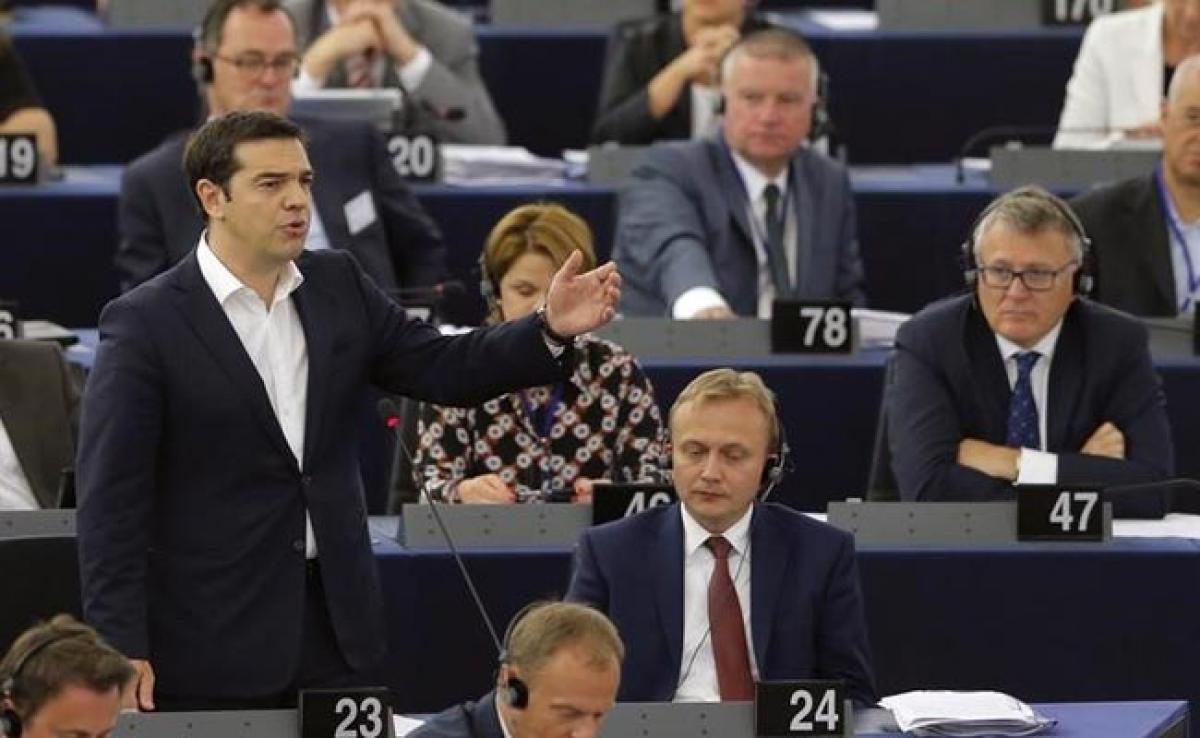Live
- The Telangana Woman Sushma Thodety Shines in the UMB Pageant's ‘Mrs. India’ Competition
- Suspect arrested after firing shots near Israeli consulate in Istanbul
- IPL 2025: Pant, Iyer, Rahul, Buttler, Shami among most-priced as 571 players set for mega auction
- Delhi Mayor poll: Cross-voting shows AAP councillors’ frustration, says Congress leader Jitender Kochar
- NIA files fresh charges against Mizoram-based arms trafficker
- From appeasement to 'New India' pitch: Nadda credits PM Modi for changing style of politics
- Bihar liquor ban gave rise to unauthorised trade, means ‘big money’ for officials: Patna HC
- COP29 Presidency launches initiative to address climate change, humanitarian needs
- Bangladesh's October foreign reserves fall below 20 billion USD
- CM Vijayan's top aide Sasi takes legal route in fight with MLA Anvar
Just In

x
Highlights
Greek lawmakers will hold an emergency parliament session today for a crucial vote on ratifying a hurriedly-concluded bailout deal, but Germany - Europe\'s de facto paymaster - has cast doubt on the agreement.
Greek lawmakers will hold an emergency parliament session today for a crucial vote on ratifying a hurriedly-concluded bailout deal, but Germany - Europe's de facto paymaster - has cast doubt on the agreement.

Greece and its creditors reached a technical agreement on a third international bailout after marathon talks in the early hours of Tuesday morning but the deal, which Greek Prime Minister Alexis Tsipras says should promptly unlock default-saving funds for his debt-crippled country, must still be approved by eurozone member states.
A Greek government source said Tsipras had called an emergency session of parliament today, and eurozone finance ministers will then meet the following day to give their verdict on the deal, Eurogroup President Jeroen Dijsselbloem's spokesman said on Twitter.
As eurozone ministers prepared to examine the accord in Brussels on Friday, Tsipras said he was confident the 400-page document - set for a parliamentary vote in Athens late on Thursday night - would be approved.
"I am and remain confident that we will succeed in reaching a deal and loan support ... that will end economic uncertainty," he said.
But in an apparent swipe at Germany, the 41-year-old premier said certain EU states had a "hidden plan to reshape the eurozone, using Greece as the excuse."
"Greece will not give them the excuse," he said.
'We have questions'
Berlin, however, has urged caution.
"We have formulated questions," Germany's finance ministry said in a statement. "These are part of the review process which is not yet completed."
German newspaper Bild cited a two-page finance ministry document that raised questions about Greece's debt sustainability, the role of the International Monetary Fund and over privatisations.
Berlin is also unhappy about Greece's annual budget targets being scaled back, Bild said.
Greece and its creditors are under pressure to finalise the 85-billion-euro ($94.8-billion) deal by August 20 when Athens must repay some 3.4 billion euros to the European Central Bank.
Separately, EU sources said Greece will tumble back into deep recession this year.
The Greek economy, which crawled out of a six-year recession only in 2014, will shrink 2.3 per cent in 2015 and another 1.3 per cent in 2016, they said.
Growth should then return, running at 2.7 per cent in 2017 and 3.1 per cent in 2018, the sources said.
Greece has repeatedly complained that the austerity measures demanded by its creditors - the EU, the ECB and the International Monetary Fund - in return for two previous bailouts have only hurt an economy that has contracted by a quarter since the crisis broke.
The latest rescue package calls for a gas market overhaul, ends most early retirement schemes, eliminates fuel price benefits for farmers and raises some taxes, among other measures.
The government said Greek banks - which were forced to shut down for three weeks as panicked customers withdrew billions of euros - would immediately receive 10 billion euros from the package, and will be fully recapitalised by the end of the year.
Months of talks
The draft deal comes after months of acrimonious negotiations between the creditors and Greece's left-wing government, which took power in January.
Investors reacted with relief to news of the outline deal, with shares in Athens closing Tuesday 2.14 per cent higher for a fourth straight day of gains.
But the positive run ended on Wednesday with the ATHEX index closing 1.93 per cent down.
An EU source said it was unclear if the bailout would be finalised by the August 20 deadline -- leaving open the possibility that Athens might need a few days of emergency funding.
"In that case, we need all the member states" to approve such a loan, the source added, in what could pose a fresh headache for negotiators.
Finland's Finance Minister Alexander Stubb - one of the hardliners on the bailout accord - told AFP that Helsinki would carefully scrutinise all the details.
Tsipras is under pressure from hardliners in his radical left Syriza party who say the new accord will pile further austerity on a weakened economy and goes against the party's campaign pledges. He suffered a major mutiny by Syriza members in two previous votes on the bailout.
The embattled prime minister has warned that he may be forced to call early elections if the dissent continues.
An analyst at Capital Economics urged caution.
"While Greece appears finally to be on the verge of receiving a third bailout, the extremely optimistic economic and fiscal projections underlying the plan suggest that it might not last for very long," he said.

Next Story
More Stories
ADVERTISEMENT
© 2024 Hyderabad Media House Limited/The Hans India. All rights reserved. Powered by hocalwire.com







